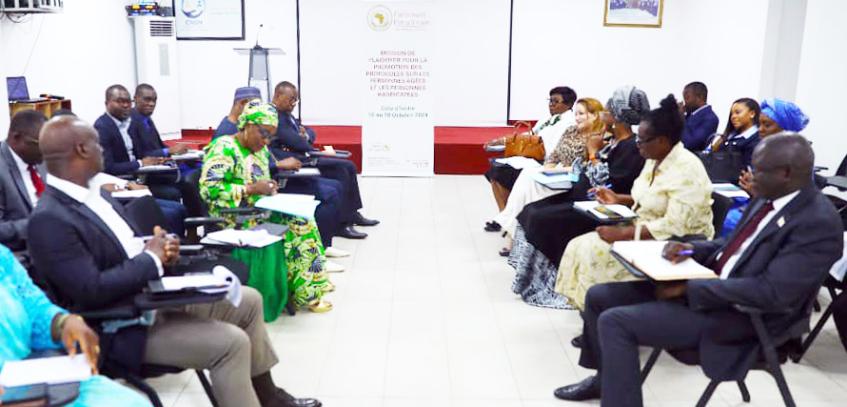The National Council for Human Rights (CNDH) of Côte d’Ivoire has committed to prioritizing the ratification and domestication of African Union (AU) Protocols focused on vulnerable populations. These protocols, developed by African institutions, reflect the realities on the ground and the aspirations of the continent. The CNDH expressed its dedication to working closely with the Pan-African Parliament (PAP) to identify and advocate for the ratification of these crucial legal instruments that uphold human rights and protect the most vulnerable.
This commitment follows a productive meeting between a delegation from the Pan-African Parliament Committee on Gender, Family, Youth, and People with Disabilities and the leadership of the CNDH in Abidjan, Côte d’Ivoire. The meeting took place during the Pan-African Parliament advocacy mission to promote the ratification of AU Protocols. The delegation, led by Hon. Mariam Dao Gabala, Chairperson of the Pan-African Parliament Committee, informed the CNDH that several protocols, including the Protocol on the Rights of Older Persons, the Protocol on the Rights of Persons with Disabilities, and the Protocol on Social Protection and Social Security, remain pending ratification in Côte d’Ivoire.
Hon. Mariam Dao Gabala emphasized that Agenda 2063, the AU’s vision for “The Africa We Want,” is built on the principle of finding African solutions to African problems. “These protocols represent this vision and address vital areas of our lives. We encourage Côte d'Ivoire to ratify and implement them at the national level to ensure no one is left behind as we shape the continent’s future,” she stated.
The President of the CNDH, Mrs. Namizata Sangaré, hailed Côte d’Ivoire’s strong track record in ratifying international human rights instruments but expressed concern over the country’s delay in adopting some AU Protocols.
“We have made significant strides in civil, political, economic, social, and cultural rights. However, addressing persistent challenges in health, education, and the protection of vulnerable groups requires prioritizing African protocols that are designed by Africans for Africa. In Côte d’Ivoire, we are ready to collaborate formally with the Pan-African Parliament to make this a reality,” said Mrs. Namizata Sangaré.








